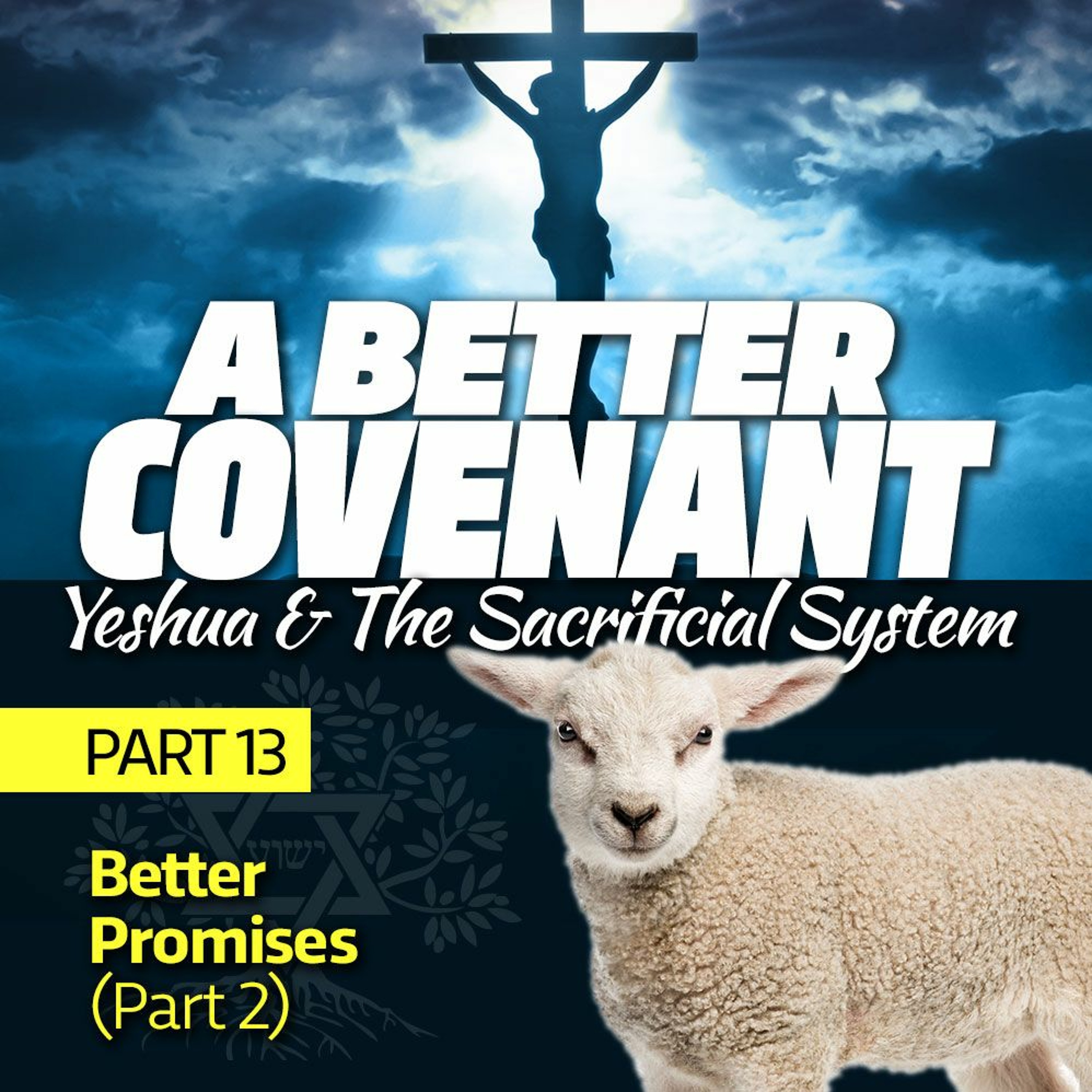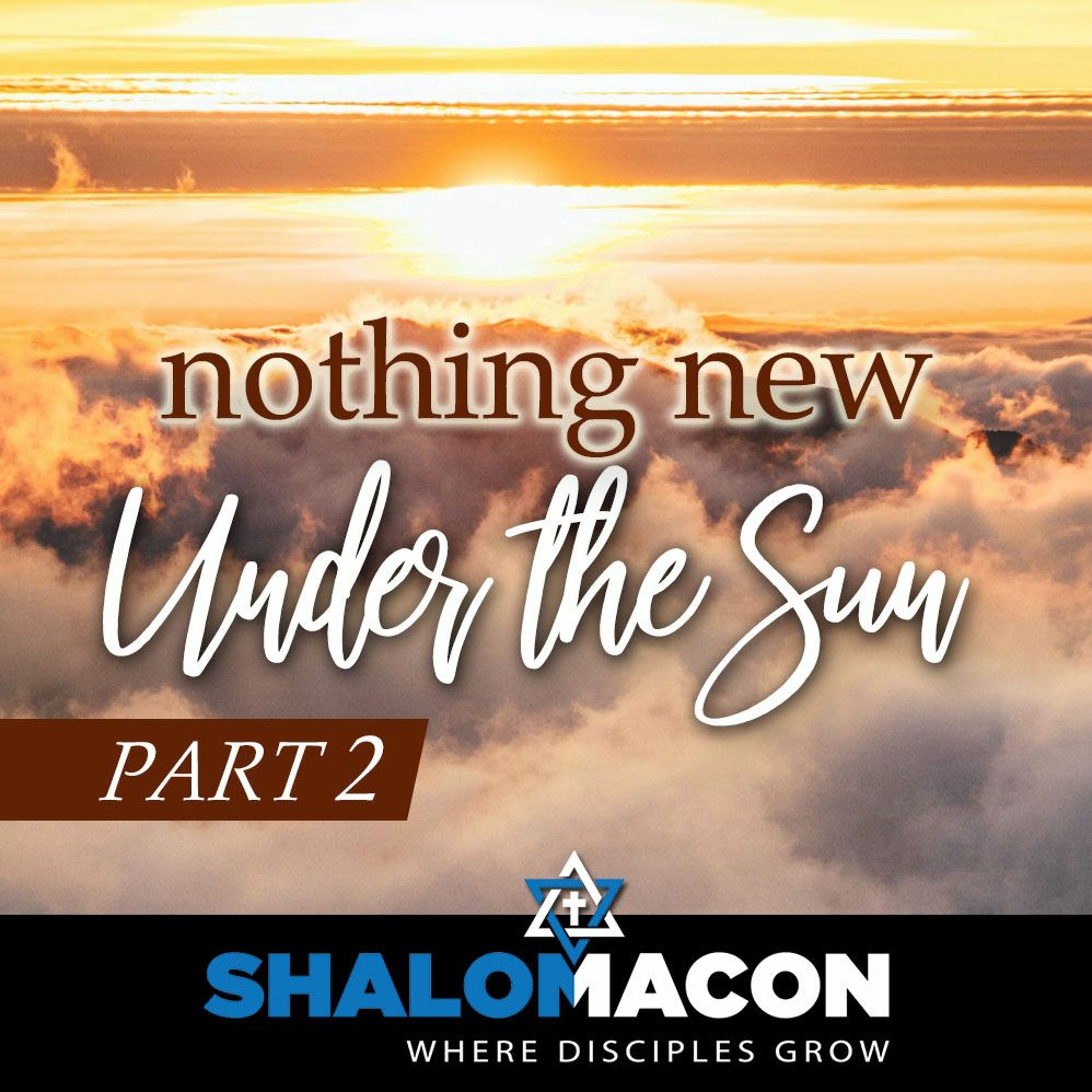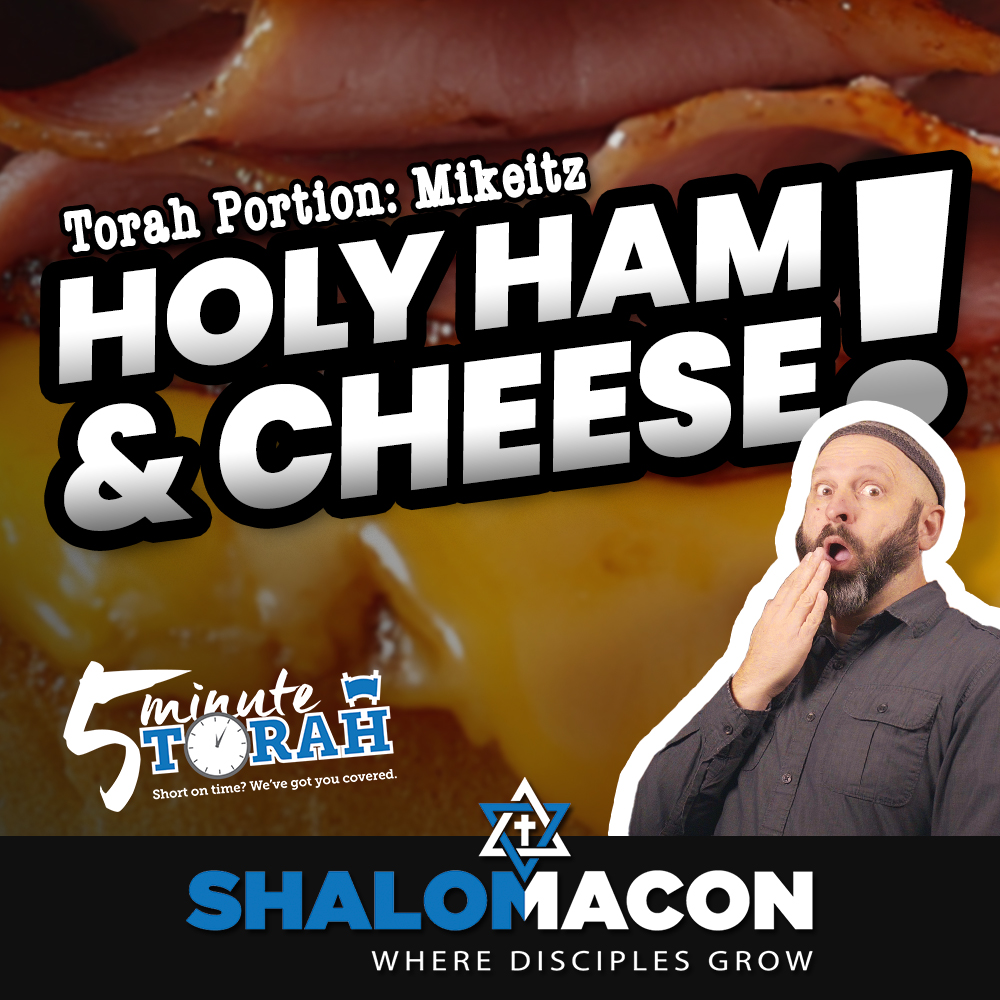Episode Transcript
[00:00:00] Have you ever had athlete's tongue? What is athlete's tongue? It's when you didn't think about what you were saying and you ended up sticking your foot in your mouth. I mean, not just your big toe, but your entire foot, maybe even both of your feet, depending on how big your mouth is. Our words are powerful and can really cause a lot of damage, sometimes hurting the people we love the most. Well, if you've ever done anything remotely close to that, then you know it's not a pleasant feeling and it caused you instant regret. Is there anything we can do to help us remember to hold our tongues in the heat of the moment? I think we can find an example in this week's five Minute Torah Shalom and blessings from Shalom Macon, the place where disciples of Yeshua learn, connect and grow. I'm Darren and before I get into the five minutes of my five Minute Torah commentary, let's cover a few quick facts about this week's Torah portion. This week we are in the 26th Torah portion and the third portion of the Book of Leviticus. We are studying the portion of Shimini Exodus 9:1, 11:47 and here are the three things that you need to know about it. Number one Tahara Vituma spiritual Purity and Impurity in the Torah portion of Shmini, the laws of purity and impurity take center stage not as matters of hygiene or physical cleanliness, but as essential markers of ritual status. These laws, rooted in tahara and tumah, define who may or may not enter the sacred space of the tabernacle, the earthly dwelling place of God's presence. Contact with things like corpses, certain animals, or natural bodily functions could render a person temporarily impure, not because they were dirty, but because they had come in contact with forces associated with mortality. In that state, one could not approach the sanctuary without first undergoing purification. These boundaries protected the sanctity of the Temple and reminded the Israelites that entering God's presence is a serious matter and should never be taken lightly. Number two Nadav and Avihu the Death of Aaron's Sons this week's Torah portion brings us face to face with the heartbreaking and sobering moment, the sudden death of Aaron's sons. Nadav and Avihu in what should have been a day of celebration, the inauguration of the Mishkan, the tabernacle. They bring an unauthorized fire before the Lord, an offering he did not command. In an instant, the fire comes forth from before the Lord and consumes them. It's a jarring scene, but it's not about cruelty or capriciousness or punishment. It's about the raw holiness of God's presence. Nadav and Abihu approach the sacred space on their terms rather than gods. Their deaths serve as a haunting reminder. Drawing close to the divine is not casual. By those who are near me, I must be treated as holy, God says in Leviticus 10:3. The closer one comes to God's presence, the greater the reward, but also the greater consequences for abuse. Number three Health or Holiness to eat or not to eat Leviticus 11 details the dietary laws that govern what foods are considered fit or unfit for consumption. These dietary laws are primarily concerned with ritual purity and obedience to God's commandments and have no direct connection to health and hygiene. As many teach, these laws served to distinguish the Israelites from other nations and to promote spiritual purity rather than physical well being. The classification of animals as clean or unclean was based on an unknown spiritual criteria rather than scientific or health related considerations. Adhering to these dietary laws was a way for Israel to demonstrate their obedience to God and and their commitment to maintaining spiritual purity. Rather than being relegated to the ancient past, these laws still apply today. As much as the day these commandments were given. To eat or not to eat. That is the question Are you a disciple of Yeshua? There are a lot of people who say they are, but when it comes down to it, they really don't even know what it means to be a disciple. Why? Because discipleship is a concept unique to Judaism. It it's an intimate relationship between a rabbi and his student. Yeshua called 12 men to be in his inner circle of discipleship, and those 12 men changed the world. What did they know about being a disciple that we don't? I wrestled with this question when I wrote my book the Four Responsibilities of a Disciple. There were a ton of books already written on how to make disciples, but I wanted to know what it meant to be a disciple because it seems that all of these disciples that were being made in our day really weren't having an impact on the world around them like they should. I found out that there were four responsibilities every disciple should know and that when implemented, living out these four responsibilities has the potential to change the world. If you want to know what it means to be a true disciple of our master Yeshua, then check out my book the Four Responsibilities of a Disciple, using the link below. This week's Torah commentary is called the Power of Silence and comes from my book 5 Minute Torah, Volume 3. This week's Torah reading records not only the dietary laws, but also the very first service of the Mishkan, or the tabernacle. It was a time unprecedented in human history when the very presence of the Lord rested upon a physical structure created by the labor of man. But unfortunately, a horrible tragedy took place immediately after this event. Two of Aaron's sons, as we discussed earlier, Nadav and Avihu, enjoyed the presence of the Lord so much that they wanted to recreate it. They entered the sanctuary with incense and unauthorized fire in order to experience this exhilarating event a second time. Rather than being enraptured, however, the results were disastrous. Now, Nadav and Abihu, the sons of Aaron, each took his censer and put fire in it and laid incense on it and offered unauthorized fire before the Lord which he had not commanded them. And fire came out from before the Lord and consumed them, and they died before the Lord. Then Moses said to Aaron, this is what the Lord has said. Among those who are near me, I will be sanctified, and before all the people I will be glorified. And Aaron held his peace. Leviticus 10:1 3. Aaron lost two of his four sons because of this incident. Many people read through this account without any empathy for this great man who was bereaved of these two children. However, without empathy, we can't realize the incredible strength and maturity of Aaron in this situation. Several translations say that Aaron held his peace. This conveys the basic concept, but the Hebrew is much more straightforward. It says that he was silent, using the word veidom. For a man who just experienced such devastation as Aaron, this shows an incredible amount of self restraint. Why is holding our tongue so difficult? What is so wrong with speaking our mind? According to a Jewish perspective, all human activity is expressed in one of three thought, speech and deed. These are called the garments of the soul because we can choose which types of thoughts, words and deeds we put on each day. Many people have the self restraint to control their deeds. Few are able to restrain and focus their thoughts. But of these three, speech seems to be the main battleground for most people. Sometimes we put on the right garment, but sometimes we don't. We must keep in mind that words are powerful. Words create words, manipulate words, connect words, convey ideas and ideals. Words bring life and bring death. Words can take a person from one world to another by way of storytelling. The fruit of our lips is an offering of worship according to Hebrews 13:15 and Hosea 14:2. This is why we must realize the power of our words and exercise restraint in our use of them. Yeshua taught us that we will be held accountable for everything we speak. I tell you, on the Day of Judgment, people will give account for every careless word they speak, for by your words you will be justified, and by your words you will be condemned. This is Matthew 12:36 37 too often the words leave our mouth before we even realize we've opened it. We must somehow find ways to heighten our awareness that this is happening so that we can gain control of our tongues. Aaron was aware of this tendency and knew that speaking in his current state would have been an error that might come back to haunt him. Rabbi Nachman of Breslav, the founder of the Breslav Hasidic movement, commented on Aaron's restraint with profound insight. He said that as a child one learns to speak, but only in maturity does one learn to be silent, and that the problem of man is that he learns to speak before he learns to be silent. Aaron had every right to throw a fit at the death of his sons, but he held his tongue. His maturity and spiritual awareness overcame his natural inclination to voice his emotional response. Because Aaron was silent in a moment that could have easily gotten the best of him, the Lord was able to open his mouth to speak a powerful word of correction to his brother Moses just a short time later. And Aaron said to Moses, behold, today they have offered their sin offering and their burnt offering before the Lord, and yet such things as these have happened to me. If I had eaten the sin offering today, would the LORD have approved? And when Moses heard that, he approved Leviticus 10, verses 19 and 20 this is the first and the only time we hear of Aaron correcting Moses. Since Aaron had chosen silence at his response. When fire came from the Lord and consumed his sons, he was given the words to speak to Moses that would set the pattern for how any type of offering was to be consumed. Going forward, they should not be eaten in a state of mourning, as we proclaim when bringing our tithe to the holy temple. I have not eaten the tithe while I was mourning. Deuteronomy 26:14. Although words are powerful, sometimes silence can be just as powerful, just as effective, and even considered an offering of Praise. See Psalm 65. 2. The next time you're at a point of outrage, remember the example of Aaron, who knew the power of silence and the damage of unrestrained speech. If you're watching this close to the time it was released, then you should know that we are in the middle of counting the Omer leading up to Shavuot or Pentecost. During the weeks between Pesach or Passover and Shavuot. It's traditional to study Perkei Avot, also known as Ethics of the Fathers. A few years ago, I published a series of videos called Perkei Avot and the Teachings of Yeshua. If you want to continue studying, then this is where you need to head. Just click on the link right here to get started.



